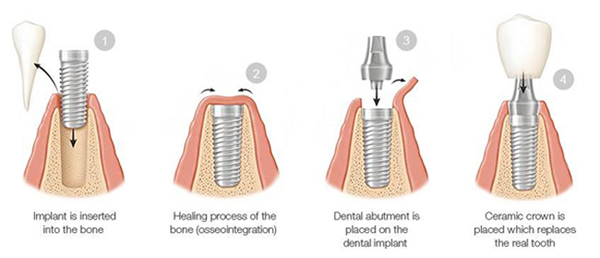An abutment is a connector that is attached to the top of a dental implant root form. A dental crown is attached to the abutment, and it replaces the part of a natural tooth that shows above your gumline.
Implant Research Shows that Height Matters
There are various widths and heights of abutments. Each patient needs an abutment that fits the implant root and helps the implant crown fit between existing teeth without being too loose or too tight. But what about abutment height?

Dental implant phases
An Implant Abutment Study
The article “Risk Factors for Bone Loss with Dental Prosthetics,” published in the June 2019 Journal of Oral Implantology, reports findings from a study of how implant abutment height affects jawbone loss. Why are the findings significant? A dental implant root, similar to a natural tooth root, stimulates the jawbone and helps prevent shrinkage. But if an abutment is too high, it can conflict with the implant root and promote bone shrinkage. Consider the findings.
The study gathered clinical data for 57 patients who received a dental implant and prosthesis between 2014 and 2018. Panoramic x-rays were used to measure several factors:
- Patient bone levels
- Implant height and diameter
- Distance between tissue anchors
- Abutment height
Researchers also analyzed whether patient age, gender, or implant characteristics contributed to the risk of bone loss.
The Results
Researchers measured the patients’ bone levels at 6, 12, and 24 months after the abutments were placed. Abutments of 4mm in height contributed to more bone loss than abutments of 3mm or 2mm in height. Taller (4mm) abutments contribute to more bone loss for several reasons:
- Increase stress on the gum tissue around the implant
- Cause the attached prosthesis to rotate and cause slight implant instability
- Increase stress on the bone while chewing
The increased stress on gum tissue and jawbone can also cause irritation, infection, and soreness.
Why were 4mm abutments used? The clinical data doesn’t reveal why doctors chose specific abutment height for each patient. But author Ömür Dereci indicates that clinicians choose abutment height according to the thickness of gum tissue around the implant abutment. The recommendation: surgically reduce the gingival thickness instead of using high abutments.
If You’re Thinking About Getting Dental Implants
If you’re thinking about having your missing teeth replaced with dental implants, you can’t select the correct abutment height to prevent jawbone loss, but you can carefully select your implant dentist. Ensure your provider has the following qualifications:
- Extensive post-graduate training in implantology, occlusion, and bite
- Access to 3D x-ray equipment to accurately measure bone and reveal oral cavities and other structures
- Extensive experience in implant surgery
- Extensive experience in restoring dental implants with crowns or an arch of denture teeth
Find at least two potential providers, schedule consultations with them, and compare your options before making a final selection.
Michael Szarek, DMD, a cosmetic dentist in Lowell, MA sponsors this post. His office is convenient to Dracut, Helmsford, Tewksbury, and surrounding cities.
